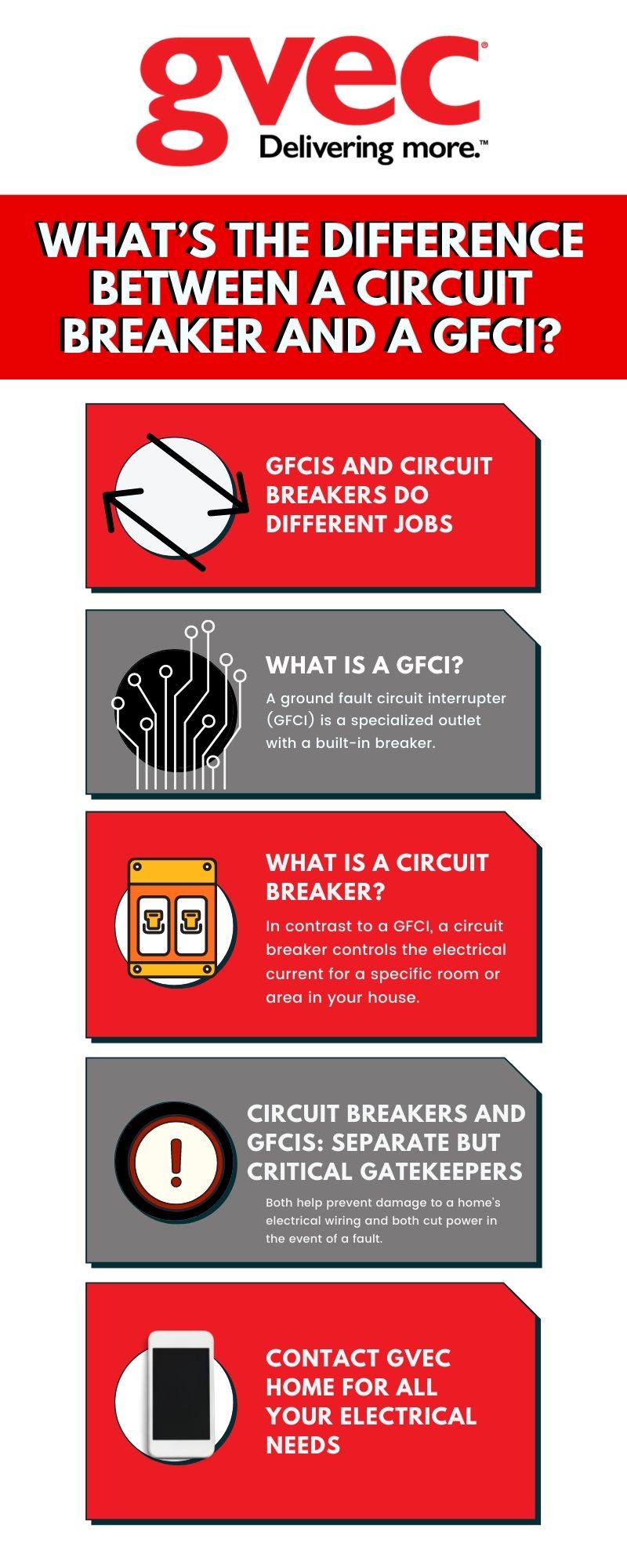Updated: Aug 31, 2023
GFCIs and Circuit Breakers Do Different Jobs

What Is a GFCI?
A ground fault circuit interrupter (GFCI) is a specialized outlet with a built-in breaker. These devices are designed to prevent shock in the event an electrical device comes in contact with water. You typically find these outlets in kitchens and bathrooms, but also near pools and anywhere else where electricity is used near water.
If you’re using an appliance in your kitchen or a hairdryer in the bathroom and its flow of electricity surges because the user comes in contact with water, the breaker inside the GFCI will trip, automatically switching off the current. When a GFCI shuts off the power this way, there’s a high probability it saved your life or at least saved you from a shock. After a GFCI cuts power, unplug the device. It’s not a bad idea to have an electrician do an inspection before resetting the outlet. However, if you decide against an inspection, make sure the area is dry before turning the power back on.
GFCIs are extremely important to the safety and wellbeing of a home’s occupants. If your home is missing them in areas where electricity is used around water, you need to add them as soon as possible. These devices save lives.
GFCIs should also be tested every month to verify proper functioning. Most include a black “test” button, making it easy and quick to perform routine testing. The red button on a GFCI outlet allows you to reset power after a test or after an automatic shutdown.
What Is a Circuit Breaker?
In contrast to a GFCI, a circuit breaker controls the electrical current for a specific room or area in your house. All of a home’s breakers are located in a central breaker box. Usually, one circuit breaker controls a single room. In the case of high-draw appliances such as a heater or refrigerator, one breaker is dedicated to each. Every breaker box also includes a master switch, which cuts power to the entire home at once.
When a surge of abnormal electric current flows through an outlet, the breaker is designed to trip and cut power to the area of the home where the outlet is located. These irregular surges are known as “faults,” defined as any abnormal electric current that flows through electrical wiring. When a circuit breaker detects a fault and trips, it prevents damage to the wiring throughout that area or even throughout the entire house. Circuit breakers can also prevent fires sparked by faults inside your walls, at the outlet or even from a plugged-in device.
Circuit Breakers and GFCIs: Separate but Critical Gatekeepers
Circuit breakers and GFCI are separate components. Both help prevent damage to a home’s electrical wiring and both cut power in the event of a fault. GFCIs also help prevent a home’s residents from being shocked if electrical equipment comes in contact with water.
Contact GVEC Home for all Your Electrical Needs
If you’ve been experiencing problems with a frequently tripping circuit breaker or if you have a GFCI not testing properly, you may need an electrical inspection. GVEC Home’s team of professional electricians can conduct a whole-home or even partial inspection to help make sure your electrical system is functioning properly and up to code.
We also offer a complete line of other types of electrical jobs, including electrical repairs and upgrades, installation of interior and exterior lighting, hot tub wiring, farm, and ranch wiring, solar panel installation, and more. Our team of fully licensed professional electricians also do troubleshooting for specific problems. If you have a job in mind but don’t see it listed on our website as one we do, give us a call at 888.590.7773 and let’s talk.


